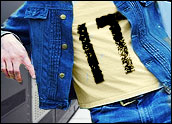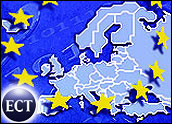
Should bloggers receive federal legal protection so they can shield sources from overzealous prosecutors? Sen. Hillary Clinton (D-N.Y.) and Sen. Pete Domenici (R-N.M.), believe so. But others in the Congressional leadership with more influence aren’t so sure.
Two pieces of legislation, S 340 and HR 581, are moving through Congress, fueled by the cases of Matthew Cooper, of Time magazine, and Judith Miller, of The New York Times, who had refused to turn over notes and names of confidential sources to Special Counsel — and the United States Attorney for the Northern District of Illinois — Patrick Fitzgerald. But the bills seek to define the noun “journalist” in such a way as to exclude individuals who do not work in the media for financial compensation.
Grand Jury Probe
Those writers who do their work professionally will not have to divulge the names of confidential sources, for a federal grand jury or a federal judge, unless national security is at stake. “This year is shaping up to be a critical year for the reporter’s privilege,” said a report by the Reporters Committee for Freedom of the Press, an industry group for the media, based in Washingto, D.C.
The legislation is gaining momentum, so to speak, just as the Federal Election Commission, an independent agency created 30 years ago in the wake of the Watergate Scandal, is moving forward with rules that might require bloggers to identify themselves as independent media, or partisan polemicists.
The proposal is quite controversial, however. “The last election showed that a wild-West mentality existed on the Internet for the bloggers,” said Ravi Singh, chief executive officer at ElectionMall Technologies, an online campaign technology provider, based in Washington, D.C. “The FEC, however, doesn’t have to be the new sheriff on the Internet.”
‘Journalists’ on the Internet
Last year, legal proposals to regulate some reporters, and to shield others, failed. The concern among policymakers — and prosecutors — is that individuals who are compelled to testify by a court might erect Internet sites and claim to be journalists in order to avail themselves of the shield laws. Legal experts are also concerned that partisan hacks will pose as journalists during an election and deceive voters — a phenomenon that happened a number of times during the last presidential election.
The new House bill seeks to remedy the first problem and to “maintain the free flow of information to the public by providing conditions for the federally compelled disclosure of information by certain persons connected with the news media,” according to the text of the bill. The law, which is under consideration by the Judiciary Committee, was introduced in the House of Representatives by Rep. Rick Boucher (D-Va.) and others.
The legislation states that no “federal entity” may compel a reporter to testify or produce a document in a federal proceeding unless the court determines, based on clear and convincing evidence, after a hearing, that the government has attempted to obtain the information from another source.
Under the law, reporters could only be summoned if they had published on the subject of the federal investigation.
There are exemptions to the law, however, which will give prosecutors some leeway if there is “clear” evidence that a crime had been committed and that the information the reporter had could make a “dispositive,” or determinative, contribution to solving the matter.
The House version of the law does not specifically name bloggers, but it does state that those who publish by “electronic or other means” are covered.
Paid vs. Unpaid
A new law is important now, because, as the Reporters Committee for the Freedom of the Press has said, the “D.C. Circuit has found no privilege protects journalists before grand juries.” In addition to the high-profile Time magazine and New York Times cases, a journalist in Rhode Island has been under house arrest for criminal contempt of court for not revealing a source, the committee said.
The shield law might protect reporters from the public courts, but some reporters might still be scrutinized in the court of public opinion by the FEC. The concern in this matter is that some blogging reporters might be receiving money from federal candidates in order to advocate for them on the Internet, according to a Notice of Proposed Rulemaking on Internet Communications, proposed by the FEC.
Rather than compel blogging reporters to file quarterly reports with the government, technology experts are recommending that bloggers display a seal on their site testifying that they are independent and do not receive funding from candidates.
“Those bloggers who choose to identify themselves will create trust among their visitors and pressure other blogger Web sites to follow through,” said Singh.
























































Social Media
See all Social Media